In September 2018, Rigzin Angmo met three friends who would a year later join her as co-founders of Kangla-Nyishar, which means sunflower in Ladakhi. The Leh-based startup makes artisanal food with locally-sourced organic produce that benefit small growers, producers and the local economy.
Joining Rigzin Angmo, you have Rigzin Yangdol, Padma Angmo and Padma Angmo in the Martselang village, who source their raw materials from local farmers and make products like three varieties of pesto—walnut, apricot and sun-dried tomato—and buckwheat tea.
All four had first met as part of the Naropa Fellowship programme, a one-year course focussed on creating “agents of change” working towards “fostering an ecosystem of entrepreneurship and growth” while preserving the “heritage of Ladakh” and the larger Himalayan region. Naropa Fellows are housed inside a residential campus in Hemis village, which lies 40 km away from Leh and barely a 1km from the banks of the Indus river.
By the end of this one-year course, they were awarded a postgraduate certificate in Leadership and Entrepreneurship. As part of the programme, students are required to come up with an idea for a business venture and the means of developing it. These four women were part of the very first batch of Naropa Fellows, who graduated in August 2019.
What inspired these women in their twenties to establish this startup? Speaking to The Better India, Rigzin Angmo recalls a class in Design Thinking, which took them on a field trip to Leh Bazaar. Their brief was to observe the different commercial establishments inside Leh Bazaar, identify a major problem and present those observations back on campus.
“We were divided into groups of four and that’s how we came together. One thing we noticed during our survey of Leh market was that most shops were run by non-Ladakhis. Even the shops run by Ladakhis were selling products manufactured in Himachal Pradesh. Funnily enough, raw materials for the products we saw in Ladakhi-owned establishments like apricot scrub and apricot oil were sourced from Ladakh. Besides Ladakhis getting shut out at the lower end of the supply chain, it was evident there weren’t many indigenously made or manufactured products that had a distinct local identity,” Angmo says.

Going Local
Backed by a strong desire to make indigenous products representative of Ladakh, the four women felt that a venture most likely to succeed would be one which maintains a close relationship with the land and local community. Following the conclusion of the programme, they spent time researching different plant species, herbs and crops grown in Ladakh, and the possible products they could make based on them.
“We visited different parts of Ladakh like Hanu and Markha Valley, met with farmers who told us about their endangered food culture, learnt their recipes and took down the names of these local plants. Upon returning to Leh, we went online and visited experts at research institutes like Defence Institute of High Altitude Research (DIHAR), where we learnt the English names for these locally-found plants and crops. Surprisingly, many of them are considered premium products outside India. For instance, buckwheat is considered a superfood in the West. In fact, during our research, some people from Mumbai asked us whether we could supply cloudberries to them. But we did not want to be the ones supplying local raw produce outside. Instead, we decided to do something with such locally-found raw produce ourselves,” says Angmo.
That’s how Kangla Nyishar was born. “We were just looking through a list of Ladakhi names for different plants and came across Kangla Nyishar. It’s just something we felt sounded nice,” she adds.
After some initial brainstorming, they narrowed down the products they would make to pesto and buckwheat tea.
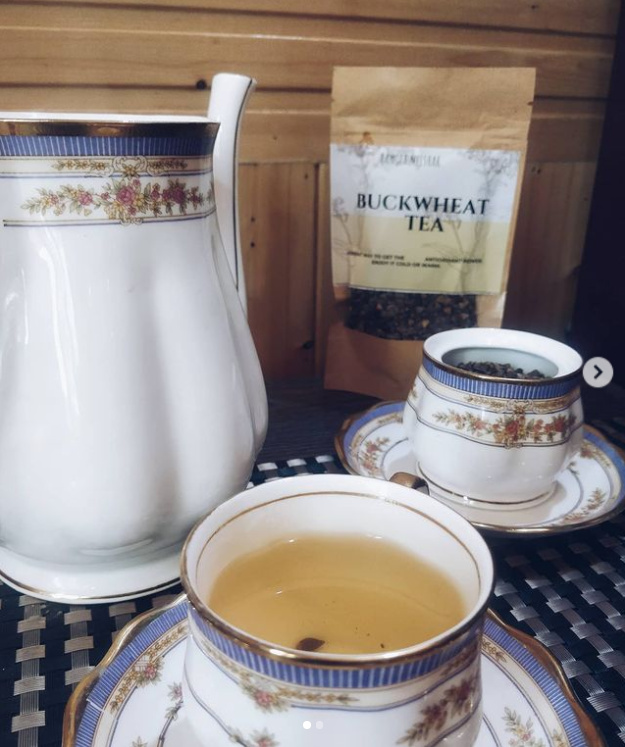
In a March 2020 Instagram post, one of the captions read: “Pesto also known as Barims in Ladakhi has been prepared in Ladakhi kitchens since time immemorial. We bring to you the recipe not inspired by Liguria (Italy) but from our very own ancestors. We present you the richness of this traditional pesto made with organic produce foraged from the different regions of Ladakh sans artificial preservatives.” Barims or pesto is made and consumed locally in areas like Sham and Hanu. In the Hanu area, it is consumed daily for breakfast.
“We initially focussed on buckwheat, barley and sea buckthorn tea since they were easier to prepare. Also, we were figuring out how to preserve pesto without harmful chemical preservatives. A month before COVID struck last year, we launched buckwheat tea and three different varieties of pesto—walnut, sun-dried tomato and apricot. We also showcased these products at the three-day National Organic Festival in February 2020 in New Delhi. There, we bagged a prize for the most unique products,” recalls Rigzin Angmo.
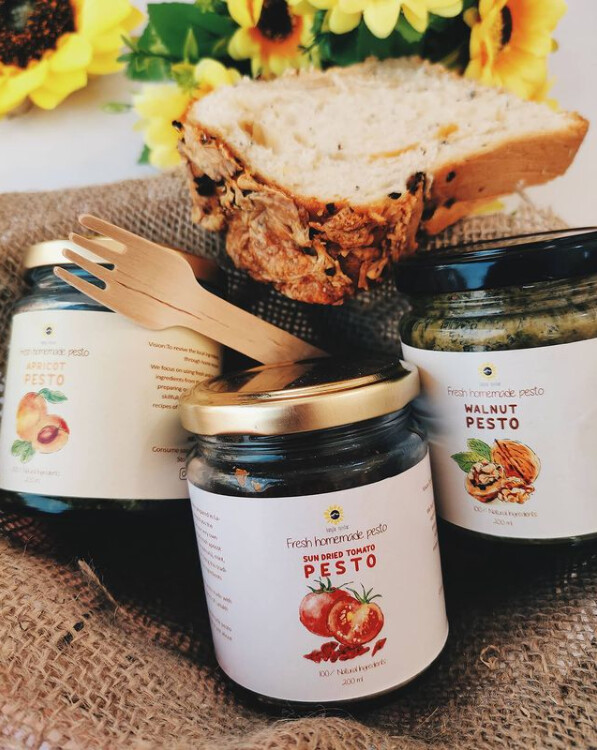
Working with the community
Kangla-Nyishar sources their raw materials largely from farmers in Takmachik, a certified eco-model village where farming is completely organic. It’s located 112 km west of Leh. From there they source walnut, buckwheat and apricot kernel, etc. Padma Angmo, one of the co-founders, is a native of Takmachik, and her relatives assist in procuring them.
They have recently ventured into making nettle tea. It is an herbal ‘tea’ made from the leaves and roots of the stinging nettle plant. The leaves and roots are sourced from Rumbak village, but they are also reaching out to farmers in villages like Tukla in Nyoma tehsil.
Since they don’t export their products and largely cater to the Leh market, their raw material demands aren’t very high. In Takmachik, for example, they source from just six farmers, but they procure buckwheat, walnut, apricot kernel, nettle, Himalayan chives and cumin as well.
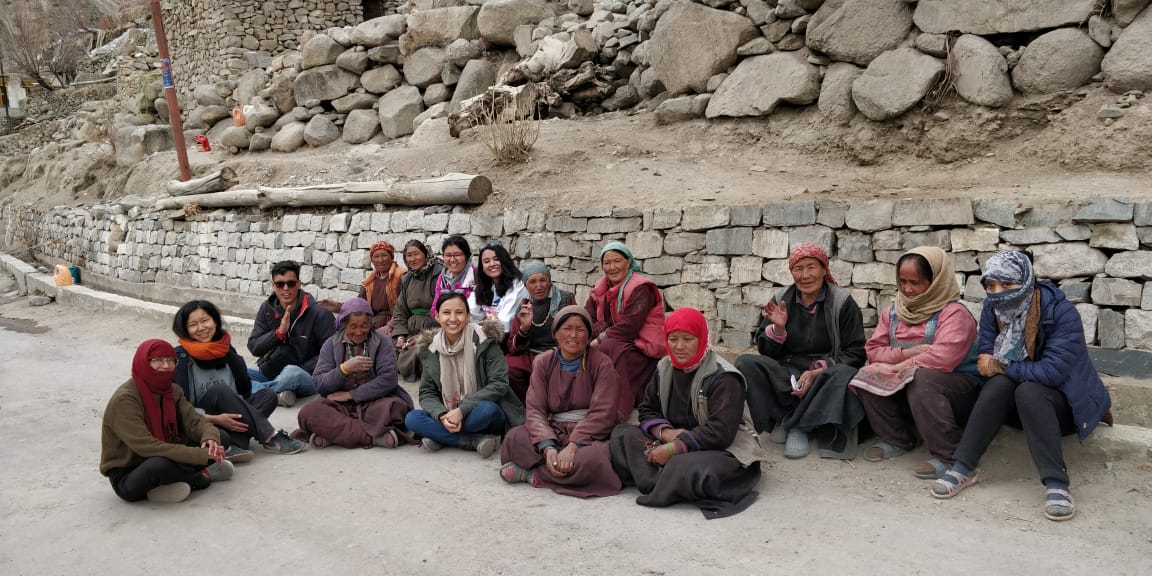
As a result of COVID-19, they stepped away from creating their own large manufacturing unit, for which they were about to take a loan. Instead, they rented out a unit in Leh. And they do possess a Food Safety and Standards Authority of India (FSSAI) license and are subject to operational checks by officials for hygiene and other requirements.
“We sell our products to retail stores in Leh. Once we enter the market in full swing, we will leverage one of the many schemes offered by the Ladakh Union Territory administration for small businesses and apply for a loan. For the time being, the four of us handmake jars of pesto weighing 200gm each and buckwheat tea packets weighing 100gm each. While each 200gm jar costs Rs 250, one 100gm packet of buckwheat tea costs Rs 100,” says Angmo.
“We have held discussions on whether to mechanise the entire process, but I have reservations about what this can do to the natural and organic process. While making pesto takes some amount of time, we can prepare 30-40 packets of Buckwheat tea in 2 to 3 hours. Besides Leh, we have received orders via Facebook and Instagram, and shipped our products to Mumbai, Bengaluru, Delhi, Himachal and Dehradun so far,” says Yangdol.
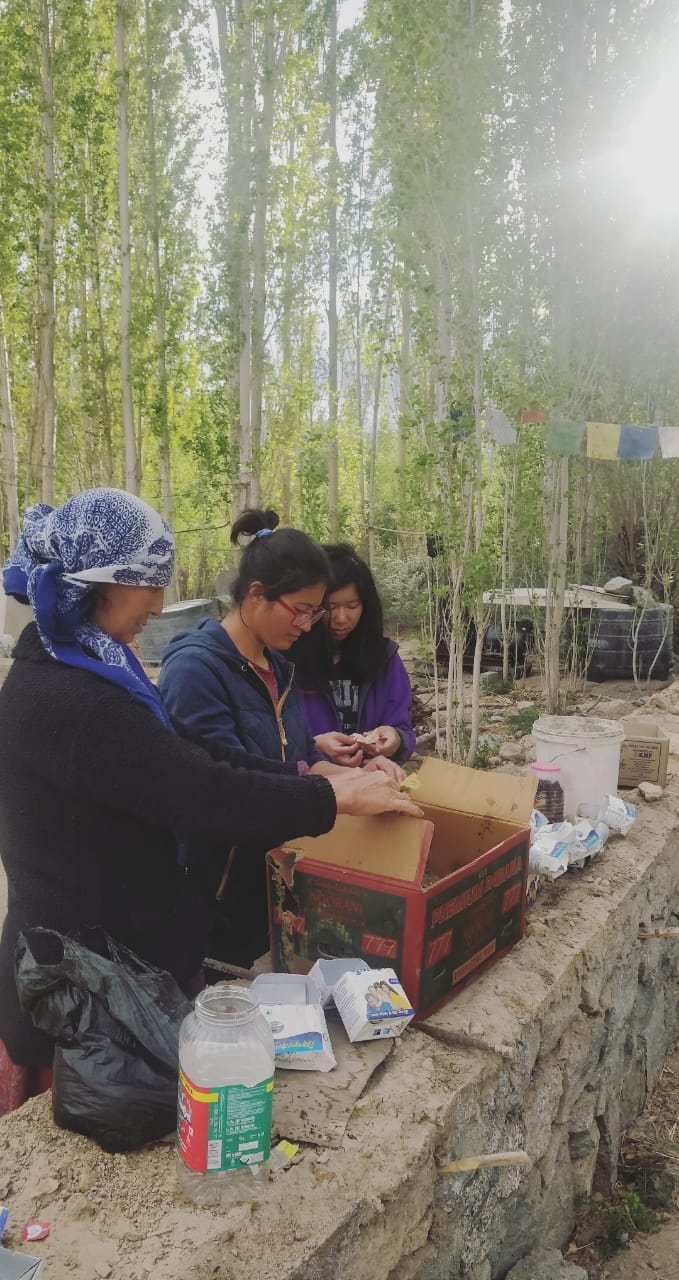
Spirit of Ladakhi Entrepreneurship
Like many young Ladakhis, these four women have made the journey back home after studying in other cities. They have come back home to start various businesses, whether it’s in food processing, apparel wear, construction or tourism. They are leveraging the region’s natural resources, familial and community networks to create something distinctly Ladakhi, but with a flavour of the world outside. After all, Ladakh has the resources to make it happen.
All four women are from different parts of Ladakh. Angmo is a native of Thiksey village, while Yangdol is from Basgo. One Padma Angmo is from Martselang village, while the other bearing the same name is from Takmachik. They have studied in schools and universities outside Ladakh in cities like Delhi, Jammu and Chandigarh.
Having said that, Kangla-Nyishar is still in its nascent stages as a venture. A few of them even work in local non-profits, while working on their startup’s products from 6pm onwards, all the way into the wee hours of the next morning.
“As a result of COVID, we couldn’t launch our products in a major way. We are currently at the stage of rebranding, coming up with a new label, different stories to describe our products and alternative packaging design. In fact, we are in the process of changing our name from Kangla-Nyishar to Nima Goos Goos, which we feel registers better in the minds of our customers outside Ladakh. Nima Goos Goos is also another name for sunflowers in Ladakhi. Once this is done, we will launch our own nettle tea and you will find our products on different e-commerce platforms,” says Angmo.
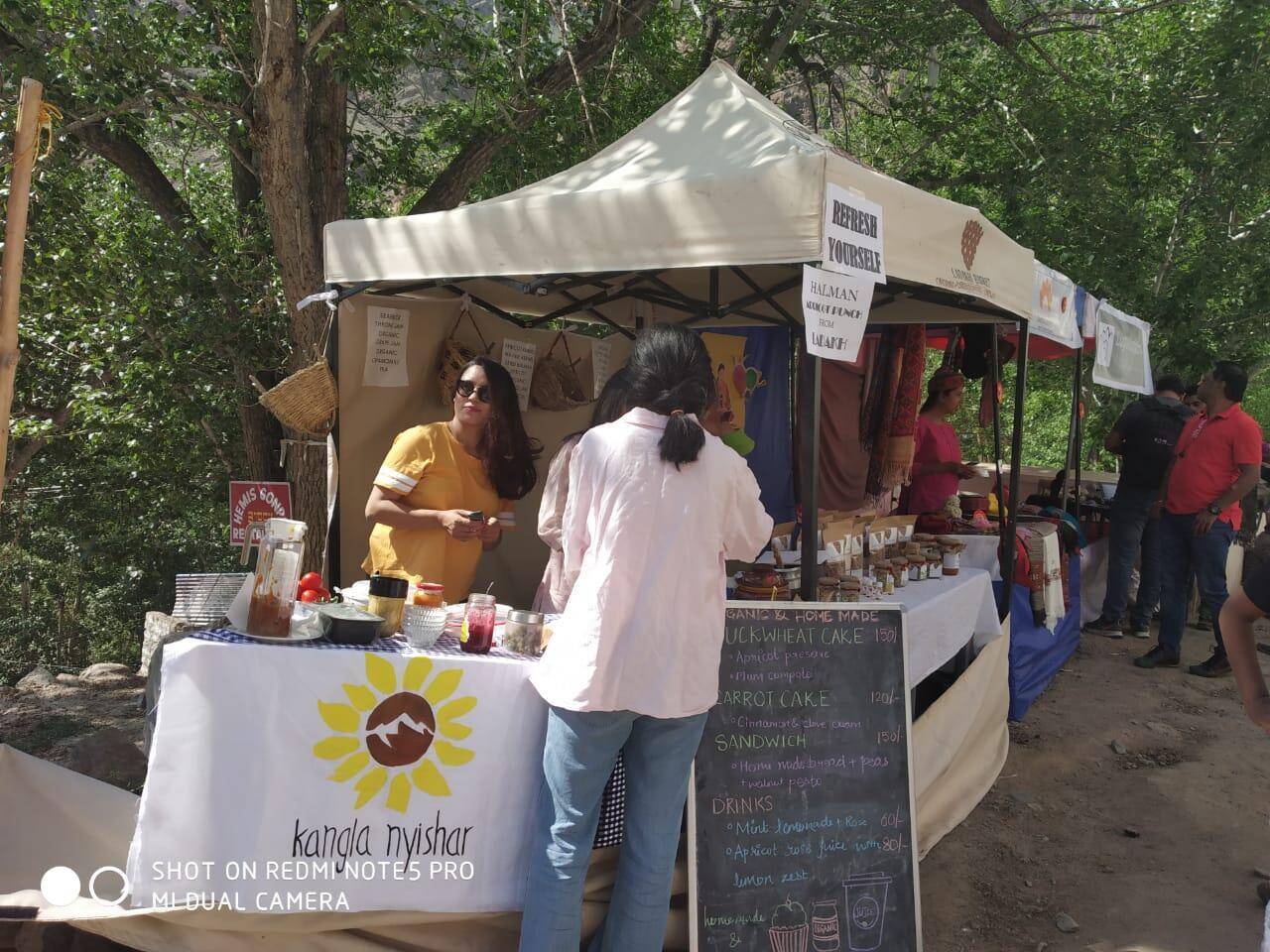
Making Pesto and Buckwheat Tea
Yangdol goes on to explain the process of making these products.
One of the examples she cites is walnut pesto or Barims which is often used as a sauce, spread or dip.
Here is how they fill up a 300 gm jar of pesto:
Ingredients:
-½ cup walnut
-1 clove garlic
-¼ of a bunch of coriander
-2-3 sprigs of mint leaves
-Salt as per taste
-Olive oil to drizzle over the top
Method:
-Put the ingredients except the salt and olive oil in a stone pestle or mixer till it forms a paste.
-Take the paste out in a bowl and mix some water to get the consistency you like.
-Add salt for taste.
-If not consuming immediately, add olive to thinly cover the top to maintain its freshness and colour.
“This can fill a 300gm jar, but that is up to the person on how much water/buttermilk they want to add. One point to note is to store it in a non reactive container. You can replace water with buttermilk for a refreshing spread,” says Yangdol.
With a light nutty taste, the main ingredient in buckwheat tea is whole grain buckwheat.
Method:
-Handpick the impurities in the grains.
-Put the pan over the wood fire or stove.
-Put the grains into the pan and once the pan heats keep stirring with a wooden spatula to roast uniformly.
-When it turns light brown or releases a nutty aroma, take the pan off the fire and spread the grains on a cotton cloth.
-Allow it to cool before storing in an airtight container.
A point to note: If the grains start to pop, stir more frequently.
Steeping method:
-Put half tea-spoon buckwheat into a cup.
-Pour boiling water.
-Keep it covered for 2 mins.
-Buckwheat tea is ready to drink.
A point to note: Add honey for sweetness
“Chew on the goodness of soaked grains after you finish the tea,” adds Yangdol.
(Edited by Yoshita Rao)
No comments:
Post a Comment